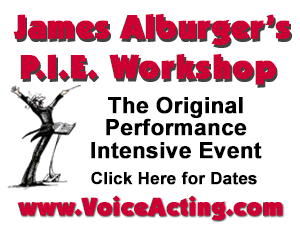|
Home Studio - Getting It 'Right'
Takes Time & Professional Help
 Note: In the webinar, Adobe Audition CS5.5: The Basics and Beyond, the author demonstrates live how to set up and use the acclaimed new audio production program - a marriage of Adobe's former Audition and Soundbooth programs. Details: http://conta.cc/AdobeAuditionWebinar Note: In the webinar, Adobe Audition CS5.5: The Basics and Beyond, the author demonstrates live how to set up and use the acclaimed new audio production program - a marriage of Adobe's former Audition and Soundbooth programs. Details: http://conta.cc/AdobeAuditionWebinarBy Dan Lenard
The Home Studio Master
There are so many wonderful, ambitious and talented people taking to the microphone these days.
The voice over industry, like many other professions, has changed and become accessible because of digital technology. What used to be a half-million dollar facility can now be virtually reproduced by amazing software and incredible digital devices.
We can do so much more with so much less.
Yet while the tech may seem simpler - or at least more accessible - is it really?
MANY AUDIO PROBLEMS
Fortunately, or unfortunately, I get to hear a great many other voice actors' audio. It's what I do as a professional home studio consultant.
From what I'm hearing, most people don't "get it."
I'm finding almost a total ignorance as to what's proper, acceptable audio for the purposes of professional delivery of commercial- and industrial-quality audio.
I hear computer fan noise, "pink noise" (hissing), and the sound of the voice actor's voice bouncing around the room like a super ball.
'HELP ME ...'
What's good though, is that many people are beginning to realize they've got problems.
My inbox is always busy with questions about home studios and how to improve their sound.
And with those questions, I get the constant mantra of "Help me, I'm not a techno-geek."
Voice actors ask me to teach them how to make good audio.
JOIN 'HOUSE' PARTY
The writing is on the wall as to what's in the future for the voice industry. The days of the big studios are gone, or at least becoming somewhat obsolete.
There are economic reasons for this, and there are practical reasons.
All of you see it. All of you want to join the "house" party. All of you want to do it right.
START WITH BASICS
However, it's time for a reality check. It won't happen overnight.
You've got to start with the basics.
Look, it took me a few years to figure it out, and I learn something new every day. I started playing with recording when Richard Nixon was President (OK, in his second term).
I had mentors, college professors and experiences at more radio stations than I can remember the call letters of.
I didn't learn it overnight. I learned it by constant repetition in an "I need it done 5 minutes ago!" atmosphere, and I had to re-learn it when I came back to it after 10 years of pursuing other interests.
YOU'LL KNOW ...
Supreme Court Justice Potter Stewart, in the censorship case of Jacobellis v. Ohio said;
I think the same can be said by all of us who have decades of experience in making sure what we record is faithfully reproduced.
How something sounds may differ from person to person.
We may perceive it differently, but trust me, we know "it" when it hear "it."
START OUT RIGHT
So, who knows best?
Well, ultimately, yeah, it's your client, whether they know or not. They sign the checks and click on the PayPal button.
But the way to never have a problem with them is to do it right in the first place.
NOT LIKE 'HOME'
So, who's second? Experienced home studio engineers and some former (or current) radio folk.
To be honest, many former radio guys have yet to succeed in what you would think is easy pickin's for them.
What they learned in radio doesn't completely translate to this new form of cottage industry.
While big studio engineers know their mic placement and how to record and mix music, many aren't experienced in the unique environment that is a "home" studio.
It's a very new phenomenon!
EVERY STUDY UNIQUE
Just like your voice, every home studio is unique.
Only a handful of people actually do understand what's involved, and many people offering advice with home studios, as well-intentioned as they are, only know one studio: their own.
Find someone with experience with many home studios and who comes recommended by their clients.
That will save you time, and time is money. It will also prevent you from experiencing hours of mind-numbing frustration.
THE RULES ...
Recording audio properly and consistently is a multi-level discipline, like karate, sailing, acting, painting or photography.
There's a set of rules, rituals, constants and variables. There are different tools. Each tool has a purpose.
fFor instance, there's a ritual to making sure everything is in order before you begin.
There are rules that govern the limits of what is possible and how much you can deviate from those limits.
To learn any discipline, you need a sensei you trust, to teach you.
WHAT'S IMPORTANT?
Do you know what to listen for? Do you know HOW to listen?
Too many people relate good audio to that loud, deep sound they remember coming out of their car stereo or those huge speakers in your dorm room.
Guess what? You're not responsible for making it sound that way.
And for the most part, most clients don't need it to sound that way.
TO SOUND LIKE YOU ...
The idea of a home studio is not to make you sound great. It's to make you sound like … you.
The majority of the time, your job is record your voice as others hear it when you talk face-to-face.
And it has to be free of background noise, both physical and electronic, and the room you record in has to have minimal sound reflection. An absence of what some might call "echo." No "pink noise."
Plus, you need to know proper mic technique.
MEASURING 'GOOD AUDIO'
There are measurements and standards for good audio, those noises or lack thereof. For instance, learn:
In audio recording, those are the variables. Learning how to use your recording software will help you adjust to those variables.
HEAR EXAMPLES
You need to hear examples of when it's right and when it's wrong.
At SaVoa, The Society of Accredited Voice Over Artists, where I serve on the Advisory Board, we use standards to see if indeed you "get it."
Do you understand the variables and how to adjust, use proper mic technique and know how to monitor what your putting out? Trust me, we can tell if you know what you're doing, or if your faking it and praying.
YOU'LL GET IT
There's no magic bullet. It's more like a feather dropping from above on a windless day.
You'll eventually get there, but one thing at a time.
Free advice is great, but using a professional who has proven he knows what he's doing, to personally teach you, is essential.
You need to have your current set-up evaluated before a potential client does.
VOICE OVER DISCIPLINES
Maybe you're getting work, but what work are you missing because while your read was spot on, your levels were too low or you can hear Spot barking or the washing machine in the background?
To be successful in voice over, you have to master three major disciplines:
If you're totally committed, don't skimp on the important knowledge. The cost of good home studio is not high, but good professional instruction on how to "get it" is far more valuable.
ABOUT DAN ...
Dan Lenard is a veteran radio personality, educator and voice talent - accredited by Society of Accredited Voice Over Artists (SaVoa), and serves on the SaVoa Advisory Board. As the Home Studio Master, he is a sought-after consultant - often solving problems by phone and email correspondence, and teaching in VoiceOverXtra webinars. He is also co-host of the popular Sunday night Ustream TV show, East-West Audio Body Shop (EWABS), featuring voice industry guests and live answers to home studio problems.
Email: homestudiomaster@verizon.net
|
|
|
Inspiring interviews help your VO career
For essential voice-over business strategies
On Michael Langsner's Voice-Over Roadmap Podcast
Get your bi-weekly dose here ... all things VO!
As of the NEW website launch, 03/22/2012










Dan - did I hear you offer to listen to, in this case, my studio and give me feedback on the sound quality?
Regardless, I am sure I will be in touch for more information and classes. I am signed up for Larry’s Adobe class at the end of May.
Stay well, stay safe and stay in.
Look forward to your AA class (and not the 12 step program)
George Whittam
Vistudiotech.com
I would only mention that not everyone in radio truly understands voice acting, which is why so many of them recommend RE20's and SM7's (not ideal for VO). I wrote the book: Sound Advice - Voiceover From An Audio Engineer's Perspective specifically for people who are afraid of the gear that is so essential to their livelihood.
To be competitive in this extremely competitive industry, you need to sound your best. It begins with you. After that your room, mic, remaining gear and ability to use all of it proficiently are essential.
Dan Friedman
www.sound4vo.cm
www.procommvoices.com
Emphasizing the technical aspect without getting technical. One I can pass along with confidence ... thanks!